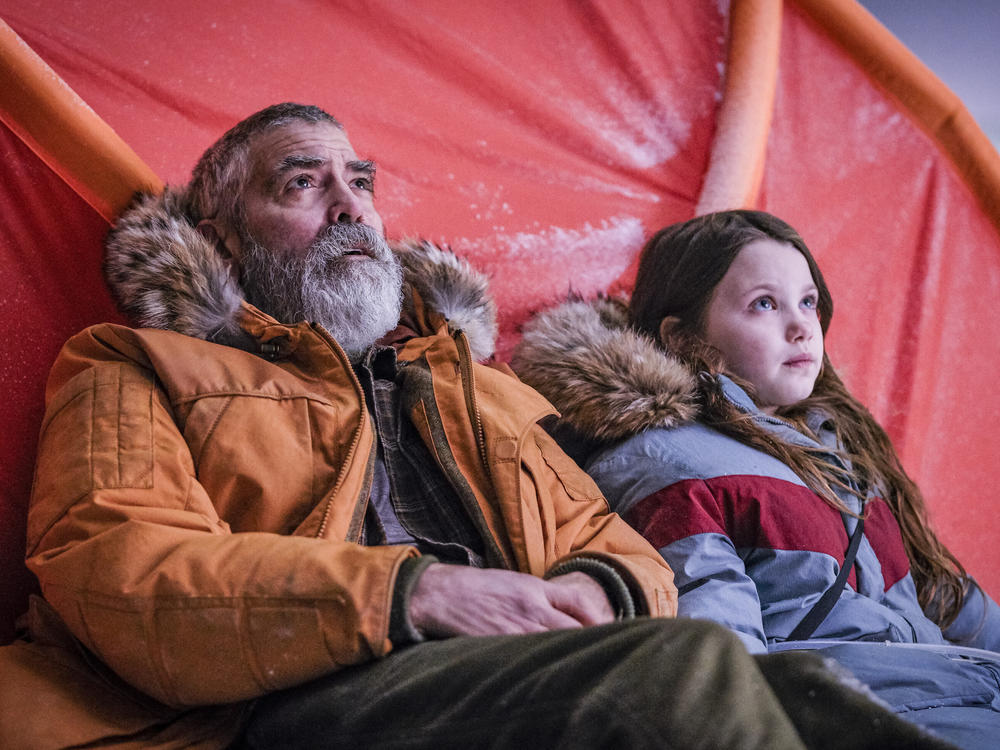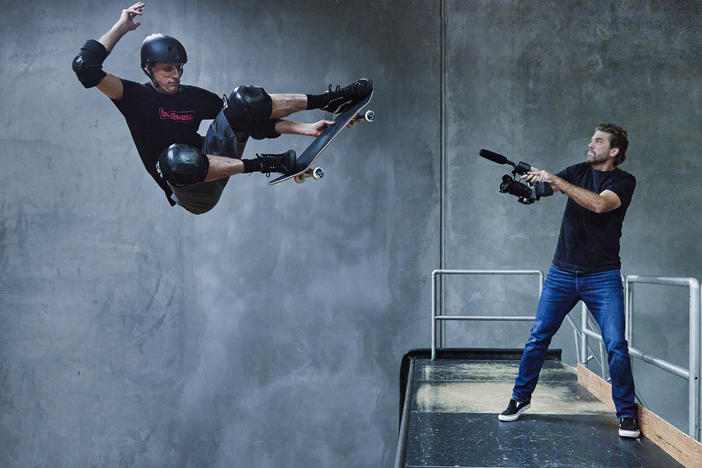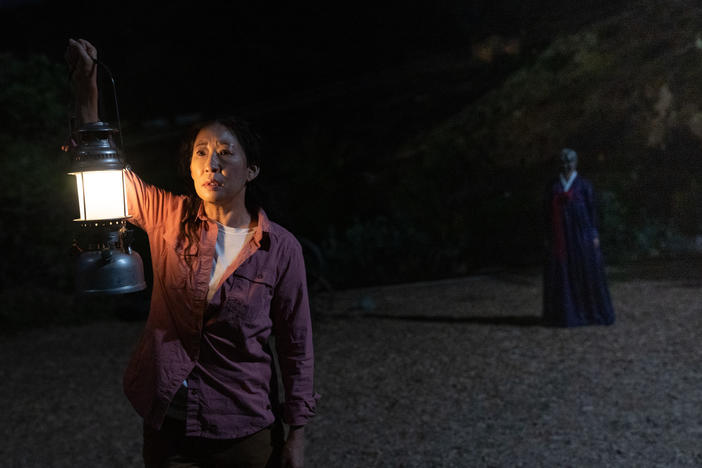Section Branding
Header Content
George Clooney's New Sci-Fi Film Is About 'Our Desperate Need' To Be With Loved Ones
Primary Content
Lulu Garcia-Navarro talks with George Clooney — actor, director, raconteur — about his new science fiction movie, The Midnight Sky, and the place we find ourselves in at the end of 2020.
Transcript
GEORGE CLOONEY: Where are you, by the way?
LULU GARCIA-NAVARRO, HOST:
Where am I?
CLOONEY: Where are you in the world?
GARCIA-NAVARRO: Like, physically...
CLOONEY: Yeah.
GARCIA-NAVARRO: I'm in Washington, D.C. I'm also in my guest bedroom (laughter).
CLOONEY: Well, thank you for, you know, the - moving it around a little bit.
GARCIA-NAVARRO: I thought George Clooney and I were going to talk over Zoom about his new movie. But...
Where in the world are you?
CLOONEY: I am in England. So I flew to England few days ago because we were going to do a drive-in premiere of the movie. And when we landed, the airport says, OK. Well, we just, while you were flying, moved to Tier 3, which meant that they cancelled the premiere. And I have to spend two weeks quarantining - can't even walk out on - by the Thames or anything. So...
GARCIA-NAVARRO: Merry Christmas, Mr. Clooney (laughter).
CLOONEY: There's 2020 right there.
GARCIA-NAVARRO: There it is.
So from the get-go, our conversation circled back and forth from Clooney's movie "The Midnight Sky" to the current state of, well, everything. His new movie is based on the book "Good Morning, Midnight" by Lily Brooks-Dalton. A global catastrophe has wiped out most of humanity. George Clooney directed "The Midnight Sky." And he also plays the main character, an astronomer living in an outpost inside the Arctic Circle in a race against time to help the crew of a spacecraft returning from one of Jupiter's moons. And though the story is set in 2049, the themes are very 2020.
CLOONEY: There's always something great about characters who are living and dying, quite honestly, with regret. I know people who are older than me who've lived with some major regrets - weren't there for their kids or didn't take the career opportunity they wish they had. And it's a real cancer in them. It really makes them bitter in a way.
And I love the movie because it talked about a lot of issues about, you know, all these things we look at, whether it's global warming or, when I was growing up, it was always duck-and-cover drills because we knew we were going to blow each other up - any of those things, any of the possibilities, something that we've done to ourselves.
GARCIA-NAVARRO: Thinking about this issue of regret - I mean, at the beginning of this pandemic, when it first happened and the lockdown happened, for me at least, I was riven with regret. I was thinking about every single thing that I should've done differently that would've landed me in a different position than I found myself, sitting in my pajamas, weeping into my glass of wine.
CLOONEY: Yeah.
GARCIA-NAVARRO: Not to be too confessional here, but I'm wondering what you found yourself in at that moment. I mean, what is it about regret that you looked back on and thought this is something that's compelling to you?
CLOONEY: Well, I will say this. I'm not filled with regret - not that I don't have the capacity for self-reflection. You know, if I get hit by a bus tomorrow, I don't think anybody who knows me would think that I didn't get a lot out of life, you know, and try to add something to the conversation. Having said that, I was, I think, probably doing what everyone was doing at the time. First, it was - I couldn't believe it. I couldn't believe we were in the position we were in. And then I was worried. You know, I have a kid - I've got a son who has asthma. And you start to worry about just basic, how are we going to do these things?
GARCIA-NAVARRO: Yeah. I mean, just - I'm sure everyone knows this, but it is my job to say these things. You are married to a famous human rights lawyer. You have two adorbs (ph) 3-year-olds, I think they are now.
CLOONEY: They are 3 1/2, they'll tell you.
GARCIA-NAVARRO: Three and a half. The movie is also sort of about relationships, parental or otherwise. It did sort of make me think about you being a relatively new father and sort of what it is that you wanted to impart as a legacy to your kids.
CLOONEY: I don't know. You know, it's funny 'cause I started so late. You know, I'm, like, Tony Randall of, you know, dads. And I - you know, I look at it - in some ways, it's easier. You know, I'm in a place where I'm a little more relaxed and not so reactionary. And here's the thing I want them to understand. The North Star for me - my parents drilled into my head from the time I was, you know, not much older than them - was that if you only do this, if you only in your lifetime challenge people with power and defend people with less power - if you only do that in your life, you will be a success.
And I've always sort of - it's been a North Star for me my whole life. And it's gotten me in trouble a few times, and that's OK. And if my kids have that in them, sort of burned into them, I think they're going to be fine. And that would be a good legacy, I think.
GARCIA-NAVARRO: I mean, I will say I'm a fan of your wife, Amal Clooney.
CLOONEY: Yeah. Me, too.
GARCIA-NAVARRO: Yeah. And she just joked about how hard it was on you during her in-depth legal investigation that resulted in her recent book that I think was, like, hundreds of pages long.
CLOONEY: A thousand pages.
GARCIA-NAVARRO: A thousand pages - that is a lot. She said that for the sake of our marriage, I will never do this again. I just wonder what your response to that was. I thought it was very sweet.
CLOONEY: Well, it was funny. So she was in the office upstairs doing her live book launch from - you know, as we're doing these things now, as you and I are doing them now - from a Zoom meeting. And I'm in the office next door doing Howard Stern's show at the same time.
GARCIA-NAVARRO: Oh (laughter).
CLOONEY: And so I can hear all these brilliant barristers and world leaders on Amal's Zoom talking about, you know, how brilliant this book is and how it's the game-changer and the book that the - that all of these people have been needing. And then I've got - Howard Stern and I are like - he's going, so did you really crap in a cat box?
(LAUGHTER)
CLOONEY: And literally, we always laugh about it. I said, our lives are, like, from Tora Bora to Bora Bora, you know, somehow. We have very - we have funny lives together.
GARCIA-NAVARRO: But you've always been very heavily involved in causes.
CLOONEY: Sure.
GARCIA-NAVARRO: People who are outspoken like yourself, like others I could name who are in the public eye, who have a particular point of view - you know, they get bashed as being sort of smug liberals, as being divisive. Does that bug you? Does that make you think that maybe there is a different way to go about it?
CLOONEY: No. Do you know - here's the thing. Could you imagine how ashamed I would be to look at my son and daughter in 20 years and they come up to me, and they say, was there really a moment in time when we had a policy that said we're going to disenfranchise and get people seeking asylum - make them not want to come here by taking their children away and putting them in cages? And I would say yes. And they said, and what did you say about it? What did you do? And I would say, nothing. I would be ashamed.
GARCIA-NAVARRO: I'm going to bring it back to the movie. What is it about space? You know, you've done a few space movies.
CLOONEY: Yeah.
GARCIA-NAVARRO: So, like, what keeps bringing you back?
CLOONEY: I actually got a call about - hey, do you want to go to space? And I was like, you know...
GARCIA-NAVARRO: Was it Elon Musk?
CLOONEY: No, it wasn't Elon. He's not a fan 'cause I had, like, the fourth Tesla ever, and it broke down every five minutes. And I said something, and then he wrote some nasty thing. Anyway...
GARCIA-NAVARRO: Who offered you to go to space?
CLOONEY: I can't tell you. But it was a pretty funny offer 'cause it was for both of us.
GARCIA-NAVARRO: Oh, wow. I am now - really want to know who's offered to go to space. All right. This has been on my mind since I read about it.
CLOONEY: OK.
GARCIA-NAVARRO: You gave a million dollars to a group of your friends in cash in suitcases the year you got married.
CLOONEY: Yeah.
GARCIA-NAVARRO: So first of all, that's an astounding act of generosity. But what struck me about that also is that you seem to have kept your regular friends from the before-fame time...
CLOONEY: Sure.
GARCIA-NAVARRO: ...You know?
CLOONEY: Well, you have to.
GARCIA-NAVARRO: Well, you say sure, but I don't know that that's a thing that necessarily is true for everybody.
CLOONEY: Well, I'm lucky. I got famous much later in life than most people get famous. I got famous at, like, 35 years old. And so it's a much better place to be when you've failed a bunch and you've been close a few times because you really do start to understand how little of it has to do with you and how a great time slot could change your life and those kind of thing. And then - and all those friends were around for all of that.
GARCIA-NAVARRO: How have you kept it going through quarantine? I mean, who have you been talking to? Have you been having, like, Zoom cocktail hours? Like, I just...
CLOONEY: We do that. Have you done that? Do you do that?
GARCIA-NAVARRO: I did at the beginning. And then I was just like, I am on Zoom all day. Like, I don't know that I can do that in the evening anymore.
CLOONEY: We do Zoom dinners. Like, we did one with Norman Lear, and we did one with the Obamas. And you have dinner. You get a little wine out. And you open up the thing. And it's like - it's almost like being there. And we've done it with a lot of our friends. But my good pals, my best friends - all of us are on the same - on one, you know, message. In a strange way, we've been - we've spent more time talking to one another than we have in a long time just because - and we honestly need it. We're all sort of in post-traumatic stress in a way...
GARCIA-NAVARRO: I'll say.
CLOONEY: ...Because we're all locked in. We're - you know, people are dealing with having to teach their kids from home or - do their kids go to school? They're dealing with the fear of dying. They're dealing with the fear of losing their job. I mean, suddenly, everything is put in play that wasn't before.
And so this is going to be a while. And you really need to have the people you are closest to as close as they can be. You know, my parents - I have to say, I really wish I could be there with them, you know, instead of just on a FaceTime call with them because it isn't fair to, you know, take a year out when you're 87. It's not fair.
GARCIA-NAVARRO: Is that your big takeaway from this moment about, like, connection?
CLOONEY: Yeah. It was funny. When I was editing the film, you know, I always thought it was a film, when we started, about what we were capable of doing to one another. And then as the pandemic hit, as I was in post-production and you started to realize that, no - what the film is and what the story is is our desperate need to be home or to be with the people we love and to be in contact with them. And sometimes, we forget that.
And all of a sudden, you take it away so you can't be in touch. And it guts you in a way. I miss, you know, hugging my sister, you know? And I can't wait to be in the same room with my family again. And so I have to say, I think we all are going through a lot of that. And you're at least reminded of how lucky you are to have somebody in your life that you love that much.
GARCIA-NAVARRO: George Clooney directs and stars in "The Midnight Sky." It's out in select theaters now and is available on Netflix December 23.
Thank you very much.
CLOONEY: Thank you. Transcript provided by NPR, Copyright NPR.
Bottom Content




